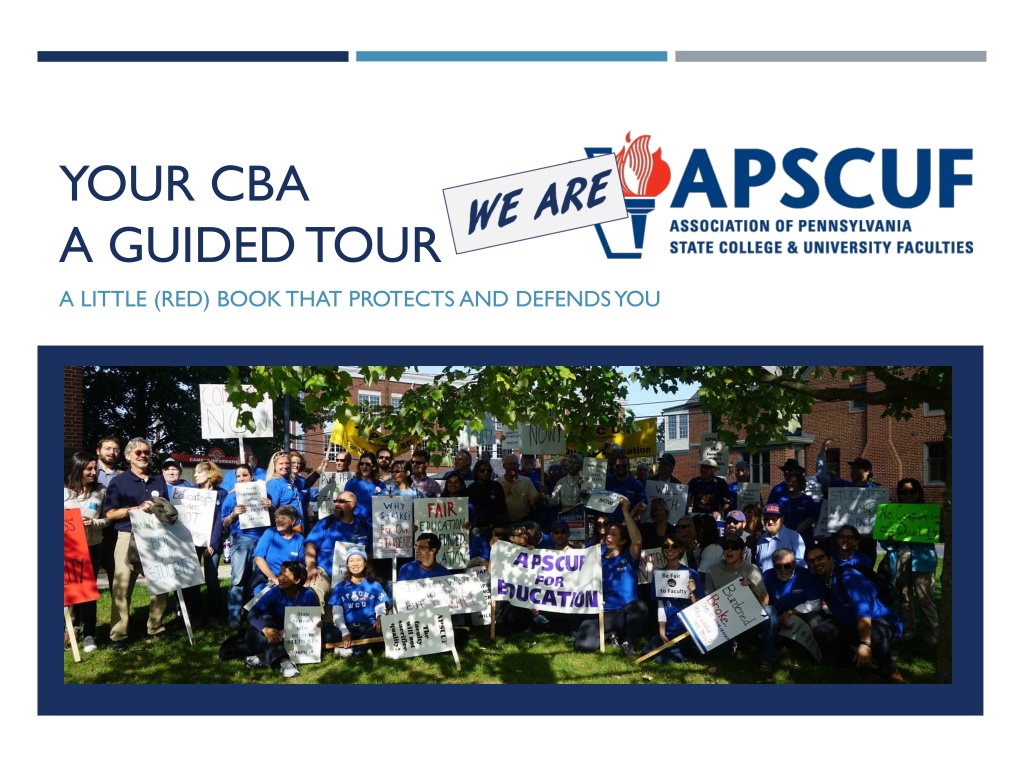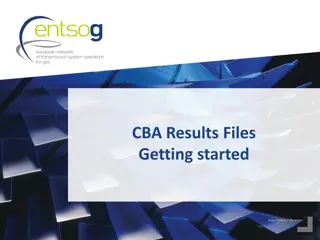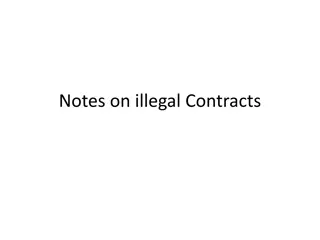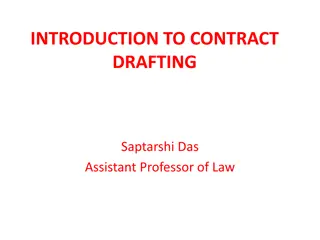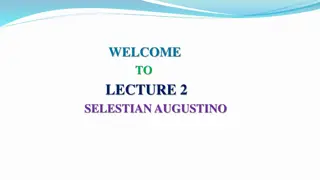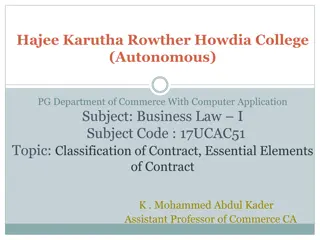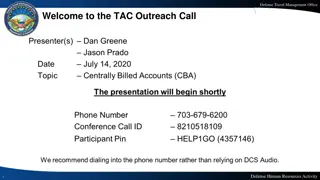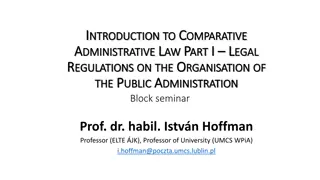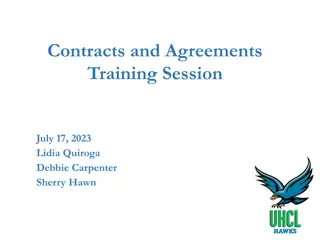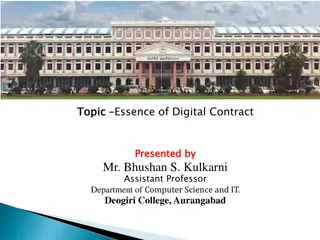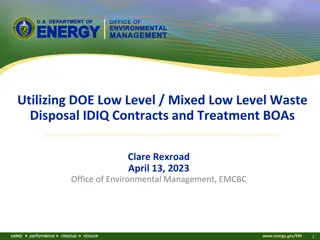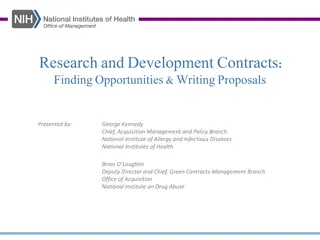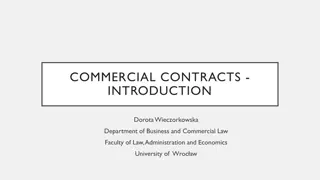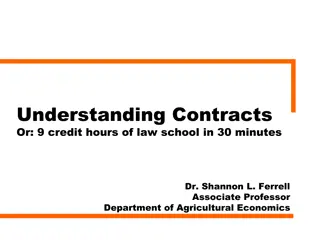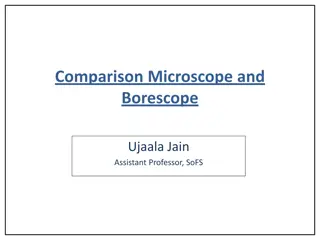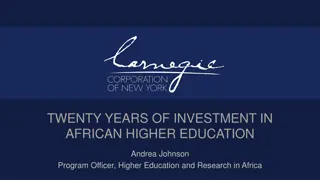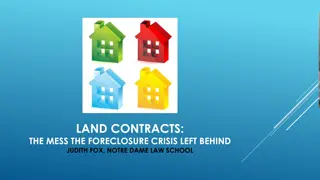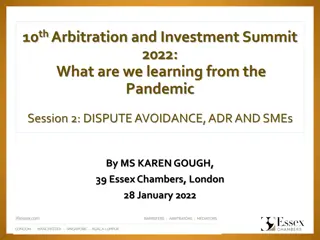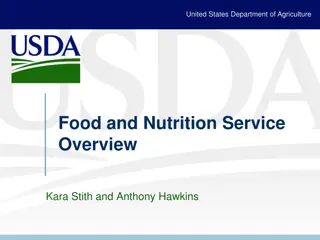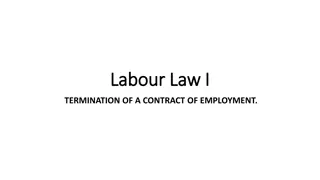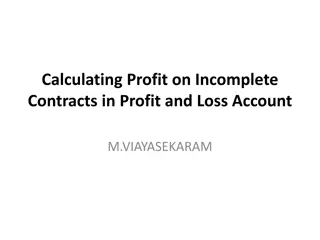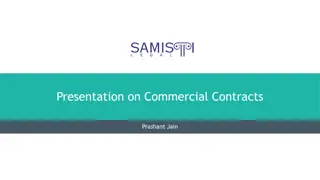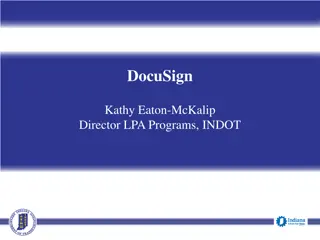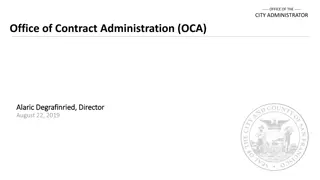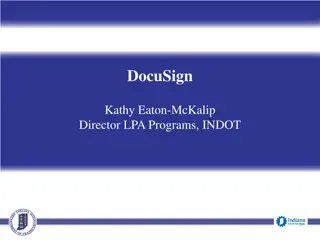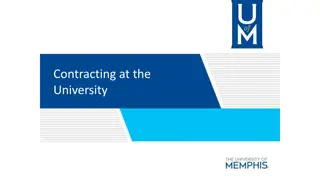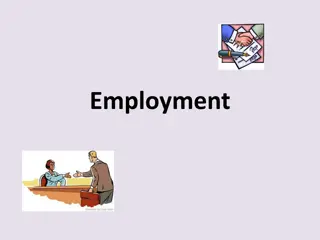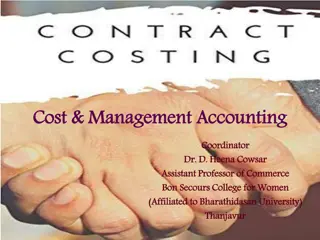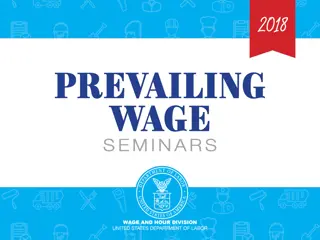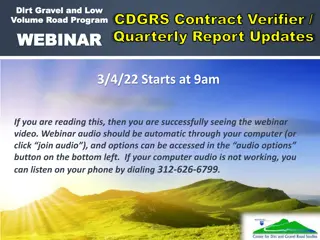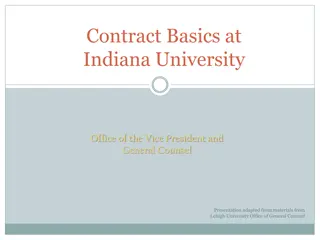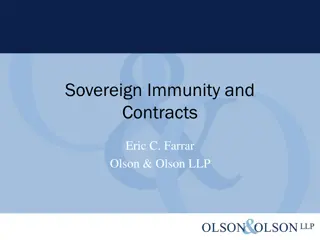Comparison of APSCUF CBA with Other Contracts in Higher Education
Explore the key provisions of the APSCUF Collective Bargaining Agreement (CBA) that aims to protect and defend faculty members in higher education. Compare how the APSCUF CBA differs from other contracts in areas such as coverage of adjuncts, conversion language, pay scales, and more. Delve into articles defining the bargaining unit, academic freedom, fair practices, grievance procedures, department chairs' roles, and the performance of bargaining unit work. Gain insights into the comprehensive protections and rights afforded to faculty members under the APSCUF CBA.
Uploaded on Sep 24, 2024 | 0 Views
Download Presentation

Please find below an Image/Link to download the presentation.
The content on the website is provided AS IS for your information and personal use only. It may not be sold, licensed, or shared on other websites without obtaining consent from the author. Download presentation by click this link. If you encounter any issues during the download, it is possible that the publisher has removed the file from their server.
E N D
Presentation Transcript
YOUR CBA A GUIDED TOUR A LITTLE (RED) BOOK THAT PROTECTS AND DEFENDS YOU
SOME EXAMPLES OF HOW OUR CBA COMPARES TO OTHER CONTRACTS APSCUF CBA Other Contracts Adjuncts not a part of the bargaining unit Includes all faculty INCLUDING Adjuncts Many contracts do not cover multiple campuses, or have many differences between how campuses operate. Statewide, covering 14 institutions Has conversion language for temporary workers to tenure track Often do not allow conversions to tenure track Often drastically different pay scales based on field of expertise. Single Salary Scale
ARTICLES 1 - 10 ESTABLISHING AND DEFINING THE BARGAINING UNIT
HIGHLIGHTS Preamble p. 2: Definitions (Regular, Probationary, Temporary, etc.). Article 2: Academic Freedom (c.f. Local Statement) Article 3: Fair Practices (Discrimination) Article 4: last sentence FACULTY MEMBERS have the responsibility to preserve and defend the goals of the UNIVERSITIES, including the right to advocate change .
ARTICLE 5: GRIEVANCE & ARBITRATION Individual Grievance vs. Policy Grievance (APSCUF) Timeliness must file within 40 calendar days*; Four steps: Informal, Written Complaint, State Level, Arbitration* If you feel your rights have been violated, quickly contact: WCU GRIEVANCE CHAIR: Chris Stangl your APSCUF department representative OR another union official
ARTICLE 6: DEPARTMENT CHAIRS Are faculty members, not managers Recommend faculty loads Management assigns 6A = duties, decision making powers (#2, 3) 6B = Selection, Election, Removal, & Assistant Chair Stipend and Workload reduction based on dept. size
ARTICLE 7 PERFORMANCE OF BARGAINING UNIT WORK Governs all teaching on campus Incl. GAs, Teaching Associates, Managers, and Staff Governs teaching in other departments and approval votes. Gives Provost and Deans (not Assist./Assoc. Deans) right to apply for Tenure and Rank. Helps guard against incursions into the bargaining unit, for both classroom and non-classroom faculty.
ARTICLES 9 AND 10: RIGHTS AND RESPONSIBILITIES Article 9 (APSCUF): Meet and Discuss, Interaction of Bargaining Agent and Management Orientation for ALL faculty (9F) incl. 90 minutes with APSCUF Due notice to APSCUF of Trustee meetings, Board of Governors, etc. Article 10 (SYSTEM): Management controls the facilities and property University controls inherent managerial policies right to direct the workforce . 10C = Blanket clause
ARTICLES 11 - 16 HIRING, PERFORMANCE REVIEW, TENURE AND PROMOTION
ARTICLE 11 APPOINTMENT OF FACULTY 11A-E governs searches and appointments from any source 11F governs hiring of adjunct (Temporary) faculty and RPT, faculty, establishes 25% cap. 11G allows for conversion of temporary faculty member to tenure track based on dept. vote.* 11H allows dept. to request permanent lines. 11-J guarantees appropriate rank after 11G conversion
NEW LANGUAGE: 11-I (ADJUNCT/TEMPORARY FACULTY) 11-I #1 defines 60 credit preferential status for adjuncts 11-I #2 requires May 31 notice re: FT status for adjuncts
ARTICLE 12 PERFORMANCE REVIEW 12B Establishes and defines three categories primary/teaching, continued scholarly growth, and service Defines process for regular faculty (12.C.1.a b.2) 3 or more members on each committee (not chair) Treats conflict of interest, outside members, change in committee members, etc. Student Evals (SRIS) in all semesters until tenure Peer Evals: 2+ from committee/semester, 1/year from dept. chair b.3 6: Vita, reviews from work in other depts., etc 12.C.1.c. 1-2 governs the proper delivery and opportunities to respond in writing to Committee and Chair Reports.
ARTICLE 12 - CONTINUED 12.C.1.c.3 governs Dean s Annual Report. 12.D. = Non Classroom Evals., 12.E. = Mixed load Faculty Evals. 12F = Schedule of probationary non-tenured faculty reviews 12F also has some language on non-renewals 12G = Eval of Tenured Faculty (5 year reviews) 12H = Temporary Faculty Reviews 12I = DE Faculty Teaching Reviews
EVALUATION DUE DATES* FOR FALL TT HIRES Year Completed by One Committee: Jan 30 Chair: Feb 8 Dean: Feb 28 Committee: November 1 Chair: Nov 8 Dean: Dec 18 SubmitT&P Materials by Nov 1 Committee Rec: Nov 1 Chair Rec: Nov 8 See Local Tenure and Promotion Policies, c.f. session by Lisa Millhous Two to Four Year 5 Tenure/Promotion
EVALUATION DUE DATES FOR TEMPORARY FACULTY Temporary w/ Fall Contract Only Nov 1 RPT Fall Hire Yr 1 Jan 30 Temporary w/Annual Contract RPT Yr. 2 - 5 RPT 6+ Committee April 1 Nov 1 Apr 8 Chair Nov 8 April 8 Feb 7 Nov 8 Apr 8 Dean Nov 30 May 15 Feb 28 Dec 15 May 15
ARTICLE 14: RENEWAL AND NON-RENEWAL Regular Faculty: annual contracts for first 5 years, renewals in years 1 - 4 Notification in year 1 (April 1) Notification for 2 4thyears by January 30; For fifth year renewal follow Article 15, Tenure Non-renewal can only be grieved in limited ways; see 145 9 14B covers Resignation.
ARTICLE 15: TENURE Will be covered by Lisa Millhous in a separate session Local Policy governs the process on our campus (updated Fall 2017). Posted on Provost s Website. Establishes the process & Tenure and Promotion Committee (TeP). Gives all deadlines as reflected in local policy. Tenure is recommended by the faculty and awarded by the President; Deans and Provosts do not write a recommendation. 15F.1 allows termination, suspension or discipline of tenured faculty member only for just cause; I5.F.2. allows for non-tenured probationary faculty lesser protection.
ARTICLE 16: PROMOTION Will be covered by Lisa Millhous in a separate session Local Policy (approved by both parties at State Meet and Discuss) governs the process on our campus (updated Fall 2017). Posted on Provost s Website. Establishes the process and the Tenure and Promotion Committee (TeP). Gives all deadlines as reflected in local policy. Guarantees 10% Salary increase upon Promotion (16C)
ARTICLES 17 - 27 WORKING CONDITIONS, LEAVES, BENEFITS, SALARIES, ETC.
ARTICLE 17: SICK LEAVE Regular full-time = 15 days/year (cumulative) Full time Temporary = 7.5/semester or 15/year (cumulative) RPT = pro-rated (cumulative) Conditions carefully discussed in 17A and B 17C = Sick Leave Bank 17D = Use Employee Self Service Portal to report sickness 17E = payout of unused sick days upon retirement
ARTICLE 18: LEAVES OF ABSENCE 18A = Sabbatical Leave One per 7 years of service for FT Tenured Faculty ONLY. Local Agreement Posted on Provost s Website. 18B = Military Leave, 18C = Civil Leave (Jury Duty, Subpoenas) 18D Professional and Educational Leaves 18E Leaves for APSCUF Service (State President, etc.) 18F Miscellaneous Leaves without Pay (incl. Pregnancy, Childrearing, Family Care Leave)
ARTICLES 19: WORK-RELATED INJURY 19A = disability pay will be equal to net pay before the accident. 19F Right to return to same dept. and rank within 3 years after becoming disabled 19G Disability retirement = 70% of final average salary with some deductions.
ARTICLE 20 RETIREMENT Article 20 allows for choice of Pension (SERS PSERS) or alternate plan (TIAA-CREF, etc.). APSCUF and Management have signaled an interest in phased retirement in future negotiations.
ARTICLE 21 FRINGE BENEFITS 21.A.1-9 = Health Benefits for Active Employees (See handouts in APSCUF Packets) A1 Eligibility: All FT Employees and their Spouses and Dependents covered; PT Faculty with 50% of a standard workload for a full year are eligible. A2 All new Faculty in PPO plan. A3 info on Premiums. Includes Healthy U, which saves $$$ on Premiums A4 5 info for PT faculty A6 gives our plan to non-represented employees A7 = Hearing benefits A8 = Benefits during leaves A.9: Prescription Drug Card with Prescription Drug Managed Rx Coverage Program Specialty Pharmacy Program
ARTICLE 21 FRINGE BENEFITS (CONTINUED) 21D = Life Insurance Policy 21E = Holidays for non-classroom faculty 21F Personal Leave Days: 9 month FT faculty = 2* 10 month FT = 3* 12 month FT = 5* 21H = Tuition Waiver = 100% for WCU, 50% for system universities. See article and local policy for conditions.
ARTICLE 22 SALARIES Defines and gives pay increases by year: Step (AI) and GPI Allows for Cash Payments for those at top of scale Designations and Steps (Schedule C, p. 76): Q01 = Instructor Q02 = Assistant Professor Q03 = Associate Professor Q04 = Full Professor
ARTICLE 23 = WORKLOAD AND EQUIVALENTS 23A = Standard Classroom Workload (credits, office hours, hours, preps, etc.) 1. Teaching Faculty 2. Library Faculty 3. Laboratory School Faculty 4. Non-classroom Faculty hours (WCU = 37.5/wk) 23B&C Administrative Faculty and Mixed Loads 23D load given for Coaching and Athletics 23E load given for Music Activities 23F load given for Forensics, Dramatics and Journalism 23G&H manner of assignment by President 23I & J President may increase loads via Meet and Discuss, or create new ones 23 L APSCUF Presidential workload (State and Local)
ARTICLES 24 - 27 COMPENSATION OUTSIDE OF STANDARD WORKLOAD
ARTICLES 24 - 27 Article 24 = Summer Employment (55% of 1/24thof Salary per credit). Article 25 = Workload Overload and Prep Overload includes exceptions to preparation (lab courses, some music courses, etc.); Student Teacher Supervisor overload; Library and other Faculty overloads. Article 26 = Independent Study and Individualized Instruction ($200 per Independent Study or Workload Hour) Article 27 = Continuing Education*
ARTICLES 28 - 30 ADDED MORE PIECEMEAL OVER TIME VARIOUS TOPICS
ARTICLES 28 - 30 Article 28 = Membership Maintenance and Checkoff establishes dues for membership and Fair Share, ability of APSCUF to maintain membership data as reported by PASSHE Article 29 = Retrenchment* Article 30 = Health and Welfare Benefits article deals mainly with System s responsibility to contribute to the fund. Eye, Dental benefits.
ARTICLE 31 MISCELLANEOUS CONDITIONS A = suitable office space and facilities B = Guarantees right to Unemployment Benefits under the law C = Faculty are Indemnified from Liability by the system in the course of doing their jobs D = Television Tapes (maintenance thereof) E = Establishes CAPC (Curriculum Committee) and its purview. See Local Bylaws on Associate Provost Website. F = Past Practice* G = Academic Advising* and Scheduling H = Deadlines falling on a Sat/Sun are extended to next business day.
ARTICLES 32 38 Article 32: Travel Expenses for AUTHORIZED travel Article 33 prohibits unlawful job actions by APSCUF and lockouts by the System. Article 34 = Interuniversity transfers (theoretically helps avoid Retrenchment) Article 35 = Legislative Action needed by contract language will be granted only when legislation exists. Article 35 = change in the law will supersede contract language but will result in good faith efforts at M&D. Article 37 = Totality ONLY CONTRACT items must be bargained collectively Article 38 = Successors*
ARTICLE 39 INTELLECTUAL PROPERTY Defines the sorts of products that the university does and does not have interest in. Defines significant financial support as $40,000 over 3-year period* Defines ownership of rights and faculty share of income for IP with Univ. interest Allows faculty to sign agreements for externally supported/owned IP Allows faculty to choose public domain
ARTICLE 40 BRANCH CAMPUSES AND OTHER LOCATIONS Must occur in appointment letter, otherwise voluntary. If part-time on other campus, primary campus must be designated in hiring letter. Faculty will be paid travel expenses to secondary campus, eg., CC faculty travel to WCU, vice versa. 40B covers teaching at other locations, with cash incentives* & development $*
ARTICLE 42 DISTANCE EDUCATION (DE) Must be in hiring letter if expected, otherwise DE is voluntary. 80%+ of course must be online C = may require training D = technical support given by university E = covers DE course approvals F = course ownership follows article 39, Intellectual Property G = DE courses are in-load, like face-to-face credits; $25/head per remote student. Other additional compensation not available in this contract H = Travel paid for costs incurred for DE course orientations, etc.
ARTICLE 43 FACULTY PROFESSIONAL DEVELOPMENT PROGRAM Not to be confused with campus grants (URF, School Grants, etc.) Statewide money not included in this contract; Governor promised in budget Revenue side of Budget still not approved
ARTICLE 44 REGULAR PART-TIME FACULTY Different status than Temporary, Part-Time Faculty Cannot take advantage of 11-G conversion Is not a tenured position May normally only work up to 50%; local grievance resolved in 2015* Different evaluation schedule, eligibility for steps, etc.
FINAL BITS AND BOBS LAST ARTICLE, APPENDICES, SIDE LETTERS
ARTICLE 45 AND APPENDICES Article 45 = Term of Agreement of CBA 7/1/2015 6/30/18. All prior agreements (local) expire in 10 years* Seniority Policy used only for Sabbatical Leave and Retrenchment (no senior or junior faculty designations, etc.), see Appendices A D Appendix E Disability Retirement Determination Procedure Appendix H Summer School pay schedule for 2018 Appendix K Overload Schedule for 2017-2018 Appendix M Wellness Program (look for HealthyU Emails) Appendix 1 PPO Blue Benefit Schedule
SIDE LETTERS Establish committees and bargaining over items of interest to at least one party in between negotiations. Includes: Peer Eval of Distance Education (not in contract!) Hours for Non-Classroom Faculty Dept. Chair and Asst. Chair Workload Terminal Degrees Virtual Office Hours (see local policy) Workload Equivalents Review Definition of Secret Ballot procedures from State APSCUF
STILL CONFUSED? CRACK A (RED) BOOK! And feel free to contact local APSCUF! *I get confused, too!
PLEASE FEEL FREE TO CONTACT ME! Mark Rimple President WCU-APSCUF Professor Dept. of Music Theory, Composition, and History mrimple@wcupa.edu
